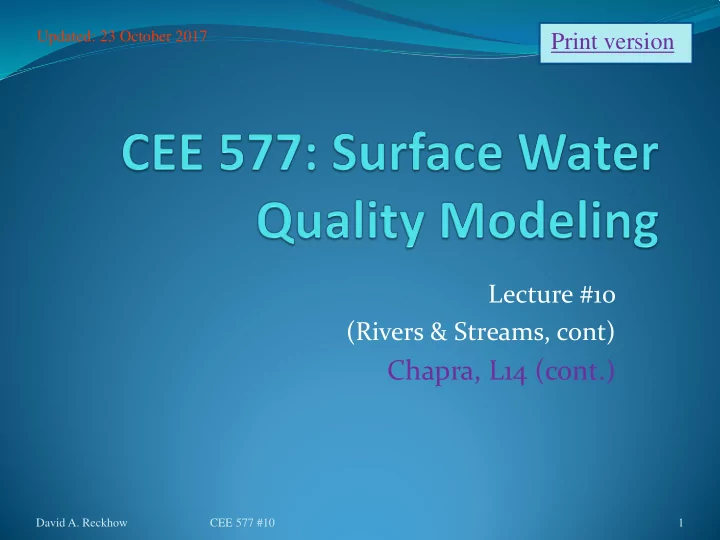

Updated: 23 October 2017 Print version Lecture #10 (Rivers & Streams, cont) Chapra, L14 (cont.) David A. Reckhow CEE 577 #10 1
Longitudinal Dispersion From Fischer et al., 1979 m/s m 2 s -1 Width (m) 2 2 U B = 0 011 . E * HU Mean depth (m) Where the Shear Velocity is: * = U gHS David A. Reckhow CEE 577 #10 2
Lateral Mixing Lateral or transverse dispersion coefficient for a stream: Mean depth lat = 0 6 * Shear velocity E . HU Length required for complete mixing: Side discharge: Center discharge: 2 2 U B U B = 010 = 0 40 L . L . m m E E lat lat Width David A. Reckhow CEE 577 #10 3
General Stream Geometry Chapra’s nomenclature for discharge coefficients = Velocity b U aQ β = α Depth H Q Width = f B cQ + β + = Where: b Because Q=UHB f 1 David A. Reckhow CEE 577 #10 4
Thomann & Mueller, problem 2.1 Sample Problem The Black River, NY between MP 74.2 and MP 64.7 is to be characterized as a constant flow - constant area reach. Assume the following cross-sectional area (A c ) were measured for the given flows: Q 500 750 1300 2200 3400 (cfs) A c 680 950 1100 1600 2200 MP 74.2 2 ) (ft MP 64.7 Estimate travel time through this reach for flows of 600 and 3000 cfs David A. Reckhow CEE 577 #10 5
β = α H Q = f B cQ β + = = α ( f ) A BH cQ 2000 A = 0 . 589 18 Q . 3 Area, sq. ft. 1000 800 700 b[0]=2.9235296469 b[1]=0.581536813 r ²=0.9788480936 600 500 500 600 700 800 1000 2000 3000 4000 5000 Flow (cfs) David A. Reckhow CEE 577 #10 6
Manning Equation Derived from the momentum balance relates velocity to channel characteristics including slope Slope of energy grade = 1486 . line = slope of stream 23 12 ft/s U R S e bed for constant H & U n Manning’s roughness Hydraulic Radius (ft) coefficient 0.012-0.100 =A c /wetted perimenter see Table 14.3 ≈ A c /(B+2H) David A. Reckhow CEE 577 #10 7
Manning Equation adapted to a Trapezoidal section 1 . 486 Q = 2 1 A R S 3 2 c e n Area, perimeter and hydraulic radius can all be expressed as a function of depth [ ] ( ) + 5 / 3 1 . 486 B sy y substitute these into the = ( ) 1 / 2 o Q S Manning Equation and e 2 / 3 n + + 2 calculate “y” from known B 2 y s 1 o “Q ( ) = + A B sy y 1 y c o = + + 2 P B 2 y s 1 o s ( ) B o + A B sy y = = c o R + + P 2 B 2 y s 1 David A. Reckhow CEE 577 #10 8 o
Distributed Systems Lecture #9 in Chapra’s book systems that have spatial resolution Ideal Reactors ∂ c ∆ V ∂ = − ± J A J A reaction in c out c t B J in J out H ∆ x David A. Reckhow CEE 577 #10 9
Plug-Flow Reactors (PRF) ∂ c ∆ V ∂ = − ± J A J A reaction in c out c t ∂ ∂ c c ∆ = − + ∆ − ∆ V UcA U c x A k Vc ∂ ∂ c c t x Combining and taking the limit as ∆ x → 0 ∂ ∂ c c = − − U kc ∂ ∂ t x And for c=c o at x=0: Which at steady state is: − = k x u c c e ∂ o c 0 = − − U kc ∂ x David A. Reckhow CEE 577 #10 10
Plug Flow vs CSTR First order reactions Q − = k x u = c c e c c + o o Q kV Mixed Flow: intermediate read section 9.1.3 David A. Reckhow CEE 577 #10 11
Mixed Flow David A. Reckhow CEE 577 #10 12
Mixed Flow ∂ c ∆ V ∂ = − ± J A J A reaction in c out c t ∂ ∂ ∂ ∂ ∂ ∂ c E c c c c ∆ = − − + ∆ − + ∆ − ∆ V Uc x A U c x E x A k Vc ∂ ∂ ∂ ∂ ∂ ∂ c c t x x x x Consider mixing in the longitudinal direction Peclet Number = rate of advective transport LU P e > 10, PFR-like e = P P e < 0.1, CSTR-like E rate of dispersive transport David A. Reckhow CEE 577 #10 13
Application of PRF to streams Point sources Q r c r Qc o Mass balance: Outfall: Q w c w Water Flow = + Q Q Q Concentration w r + Q c Q c = w w r r c + o Q Q w r David A. Reckhow CEE 577 #10 14
Assumptions David A. Reckhow CEE 577 #10 15
Chloride Problem 1.55 cfs/MGD Determine the required industrial reduction in chlorides to maintain a desired chloride concentration of 250 mg/L at the intake Water intake Q w =6.5 MGD c w = 1500 mg/L Q=25 cfs c=30 mg/L Q T = 5 cfs c T = 30 mg/L David A. Reckhow CEE 577 #10 16
W Q Q x x+ x s x s x+ x x x+ x David A. Reckhow CEE 577 #10 17
To next lecture David A. Reckhow CEE 577 #10 18
Recommend
More recommend